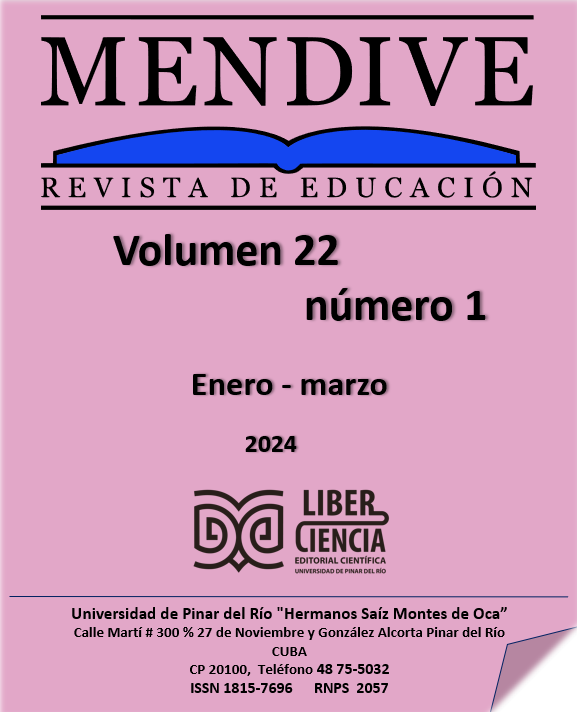Social-emotional approaches to reduce cyberbullying in upper secondary education students
Main Article Content
Abstract
Information and Communications Technologies (ICT), as a basic support for educational activities, have influenced the relationships between students, teachers, and the family itself, due to the ease of access to new knowledge, as well as the spread of alterations. psychological conditions that can trigger anxiety, irritation and stress behaviors. Cyberbullying or cyberharassment is an educational and social problem that negatively influences its victims. The objective was to analyze the effect of a program of socio-emotional strategies to reduce cyberbullying, in upper basic level students of an educational institution in Ecuador, during 2023. A mixed methodology with a quasi-experimental approach was used. The sample was intentional, made up of 69 8th year high school students between 10 and 12 years old. A control group and an experimental group to which a socio-emotional strategies program was applied were compared. The variables analyzed were: level of cyberbullying (electronic insults, impersonation and exclusion) and Socio-emotional strategies program. The pre-test and post-test analyzes were contrasted with the non-parametric Mann Whitney U Test, after descriptive analysis. Statistically significant differences were found between the averages of the experimental group compared to the control group, with lower values in the levels of cyberbullying in the post-test in the three dimensions. The results obtained constitute a practical proposal with significant impact to reduce cyberbullying in high school students of a public institution in Ecuador.
Downloads
Article Details

This work is licensed under a Creative Commons Attribution-NonCommercial 4.0 International License.
References
Chuquiray, M.E. (2022). Programa familias fuertes para desarrollar habilidades socioemocionales en estudiantes de secundaria de una institución educativa pública de Lima, 2022. Repositorio Institucional: Perú. https://repositorio.ucv.edu.pe/bitstream/handle/20.500.12692/108032/Chuquiray_DPME-SD.pdf?sequence=1&isAllowed=y
Estévez, E., Flores, E., Estévez, J., y Huescar, E. (2019). Programas de intervención en acoso escolar y ciberacoso en educación secundaria con eficacia evaluada: una revisión sistemática. Rev. Latinoam. Psicol., 51(3), 210-225. https://doi.org/10.14349/rlp.2019.v51.n3.8
Fonseca, O. (2019). Programa de habilidades sociales para prevenir la violencia escolar en los estudiantes de segundo grado de educación en la Institución Educativa N 1649 "Eloy Soberon Flores" San Igancio. Repositorio Institucional Universidad César Vallejo: Perú
Gulliana, L.P. (2023). Acoso escolar cibernético en el contexto de la pandemia por COVID-19. Revista Cubana de Medicina, 59(4), 1362. http://revmedicina.sld.cu.med.article.view
González, K.J., Fernández, E.R., Vera, V.G., Otiniano, M.Y., y Calvanapon, F.A. (2022). Ciberbullying un enemigo invisible en adolescentes: una Revisión Sistemática. (Ponencia). 2nd. LACCEI International Multi-conference for Engineering, Education and Technology. Virtual Edition. https://laccei.org/LEIRD2022-VirtualEdition/full-papers/FP176.pdf
Guevara, C., Rugerio, J., Hermosillo, Á., y Corona, L. (2020). Aprendizaje socioemocional en preescolar: fundamentos, revisión de investigaciones y propuestas. Revista electrónica de investigación educativa, 22. http://www.scielo.org.mx/scielo.php?pid=S1607- 40412020000100126&script=sci_arttex
Moya, A. y Moreta, R. (2022). Víctimas de cyberbullying y su influencia en las dificultades de regulación emocional en adolescentes del Ecuador. Psychology, Society & Education, 14(1), 6775. https://doi.org/10.21071/psye.v14i1.14066
Nguyen Thao, N. y Guerra Rubio, L. M. (2021). El Ciberbullying como reto para la Educomunicación. Alcance, 10(26), 173197. http://scielo.sld.cu/scielo.php?script=sci_arttext&pid=S2411-99702021000200173
Pinedo, G., (2020). Actividades socioemocionales para mejorar el aprendizaje de niños y adolescentes de la institución educativa18037. Repositorio Institucional Universidad César Vallejo: Perú
Redondo, J. (2023). Variables asociadas al fenómeno del ciberbullying en adolescentes colombianos. Revista de Psicología (PUCP), 41(1), 219-239. http://www.scielo.org.pe/scielo.php?pid=S0254-92472023000100219&script=sci_arttext
Rodríguez, L., Orejudo, S., Celma, L., y Cardoso, M. (2018). Mejora de las competencias socioemocionales en el aula, con jóvenes de Educación, mediante el programa SEA. Electronic Journal of Research in Educational Psychology, 16(3), 681-701. https://doi.org/10.25115/ejrep.v16i46.2241, https://zaguan.unizar.es/record/76905
Rodríguez, A.J., Mero, O., Solera E., Herrera, M., & Calmaestra, J. (2020). Prevalence and psychosocial predictors of cyberaggression and cybervictimization in adolescents: A Spain-Ecuador transcultural study on cyberbullying. PLoS ONE 15(11): e0241288. https://doi.org/10.1371/journal.pone.0241288.
Rodríguez, W. (2021). Influencia del programa de alfabetización digital sobre la prevención del ciberacoso en estudiantes de una institución educativa de Phara, 2021. Repositorio Institucional Universidad César Vallejo: Perú https://repositorio.ucv.edu.pe/bitstream/handle/20.500.12692/70202/Rodriguez_%c3%91W -SD.pdf?sequence=1&isAllowed
Valencia, J.C. (2021). Educación + TIC: ¿Un cambio de época? Cienfuegos: Editorial Universo Sur.


